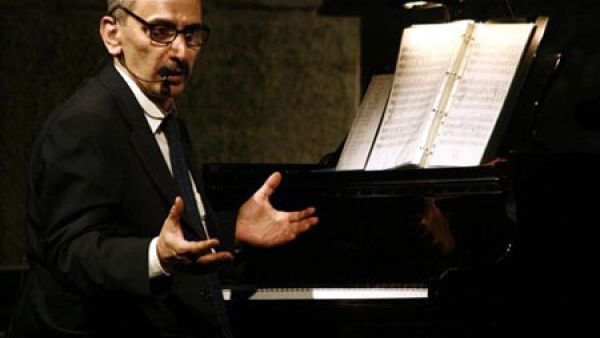Lebanon’s multitalented artist Ziad Rahbani is making a comeback to the stage next month, after nearly two decades of absence, in a black comedy addressing the effect of oppressive regimes on individuals.
The musical “Madman Talking,” by playwright-director Lina Khoury, is an adaptation of an international play – she is reluctant to reveal which one – rewritten to apply to Arab societies and shed light on the unending battle for freedom of opinion.
“The play was first staged by my students in LAU,” Khoury told The Daily Star. “I felt like it reflects the status quo in Lebanon and the Arab world and decided it must be staged at a wider scope.
“I had to seek professional artists and I thought of Ziad. To my surprise he said ‘yes’ without hesitating,” she said. “I think he surprised himself as well.”
The play’s main character, Nahida Noun – played by actress Nada Bou Farhat – writes a publicly disseminated article in which she expresses her opinion about the regime’s repression of freedoms.
She is then imprisoned by the government, tortured, transported to a sanitarium and placed in a room with an actual crazy man (Gabriel Yammine), who thinks he runs an orchestra.
Inside the sanitarium, her therapist (Rahbani) tries to convince her that she really is crazy and attempts to strike a bargain with her – her liberty in exchange for admitting that she has wronged the regime.
Alongside the three actors are Andree Nakouzi, Aline Salloum and Elie Kamal. The music, written by Ousama al-Khatib, will be performed live by an orchestra of 16 musicians.
Yammine said he was very excited about the play, which depicts “real social situations that people encounter in [one] way or another.”
“It is about the madness of our society ... the sanitarium is way more than a mental hospital – it is a prison.”
Rehearsals for the one-hour show, scheduled to open Oct. 3 at Beirut’s Masrah Al-Madina, started almost two months ago.
The team is thrilled by Rahbani’s participation in the play and, as Khoury puts it, feels “privileged.”
“It was a dream for me to work with Ziad,” Khoury said.
“He is simply a genius.”
“We cannot believe he is working with us,” added Yammine. “It is a really important step and we are benefitting from his experience on stage.”
Rahbani, the son of famous Lebanese composer Assi Rahbani and renowned Lebanese singer Fairuz, is a composer, pianist, performer, playwright, and political commentator.
He is known for his outspoken political criticism, often expressed through his plays.
Rahbani appeared for the first time on stage in “Al-Mahatta” (The Station) in 1973, playing the role of a detective. His last stage appearance was in 1996, in “Al-Fasl al-Akhar” (The Other Season).
Khoury, a prominent artist, is known for several plays, among them “How I Learned to Drive” and “It is Time to Talk.” She is perhaps most famous for “Women’s Talk,” a daring play about a group of women who engage in open discussions about their sexuality and sexual problems that ran for two years.
She said that her new play was a cry in the face of social repression.
“We live in a society that judges, tortures or puts down anyone who thinks, questions or states his opinion over politics, traditions, religion or any other topic,” said Khoury. “We are not allowed to think.
“We are addressing repression in a sarcastic way,” she continued. “The play is painful and funny at the same time ... [The audience] would laugh out loud at many scenes but at others would feel deeply troubled.”
As for the connection between the theme of the play and the so-called Arab Spring, Khoury said that the play was indirectly linked to the revolutions that swept the region, which she did not seem optimistic about.
“We seem to be heading to an even worse situation,” she said. “There will always be repression.”
‘Madman Talking’ will take place at Masrah al-Madina from Oct. 4 until Nov. 17, every Thursday, Friday, Saturday and Sunday at 8:30 p.m. For more information, please call 01-753-010.








